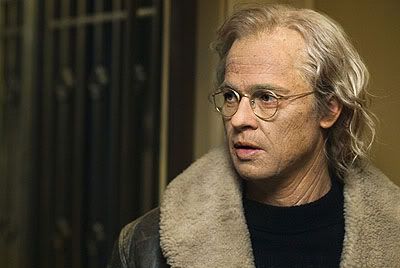
"My name is Benjamin Button, and I was born under unusual circumstances."
And so begins Benjamin's story in The Curious Case of Benjamin Button, a beautiful, heartbreaking film by David Fincher packed with tender, loving performances and some of the most astounding visual effects we have ever seen.
With his last movie, Zodiac (2007), Fincher reinvented himself with a focus on character over his usual stylistic flourishes. Now he's gone unapologetically sentimental with Benjamin Button, which uses an F. Scott Fitzgerald short story as its jumping off point.
The story begins with Benjamin's birth in New Orleans (Fitzgerald set his story in Baltimore) in 1918 on the day that marked the end of World War I. After his wife dies in childbirth, Thomas Button (Jason Flemyng), is horrified by the wrinkled, decrepit infant left behind and abandons him on the steps of a nursing home. A worker there, Queenie (Taraji P. Henson), finds the baby and takes him in, even though a doctor explains that his body shows all the signs of an elderly man sitting impatiently on death's doorstep.
But Benjamin does not die—not when the doctor expects him to, at least. He grows up, a child in the body of a senior citizen, physically growing younger as he ages. In the nursing home, where the residents are never long-term, no one other than Queenie and her beau, Tizzy (Mahershalalhashbaz Ali), notices.
Despite his condition (and perhaps even more so because of it), Queenie loves Benjamin as if he is her own son. Henson (Hustle & Flow), imbuing Queenie with so much love and goodness, quickly emerges as the movie's heart.
Brad Pitt, Fincher's favorite leading man, having collaborated with him previously on Se7en and Fight Club, is sensational as the title character, effectively melding his movie star and character actor sensibilities. Though he has an Oscar nomination on his resume (best supporting actor, 12 Monkeys, 1995), he is seldom recognized for the talent he is. Benjamin Button should change that. What he does as Benjamin is understated, but no less remarkable because of it.
Pitt's performance is made possible by makeup and digital effects that place his aged face onto other actors to portray Benjamin at different stages in his life. It's done so seamlessly that it's almost startling when Benjamin has aged to the point where he is readily recognizable as Pitt—talk about an actor disappearing into a role.
Technical wizardry also allows the always luminous Cate Blanchett to portray Daisy from a young woman to her deathbed, which provides the story's framing device. As she lies in a hospital, Hurricane Katrina bearing down on New Orleans, she has her daughter, Caroline (Julia Ormond), read to her from Benjamin's diary.
Benjamin and Daisy meet as children, and Daisy innately recognizes that Benjamin is not the old man he appears to be. They go their separate ways—Benjamin to work on a tugboat that gets recruited to join the U.S. Navy during World War II, and Daisy to follow her dream of becoming a professional dancer—but they eventually find their way back to each other.
With its decades-long story and somewhat passive protagonist, Benjamin Button's closest cinematic relative is Forrest Gump (1994) —which does not come as a surprise since Eric Roth scripted both (Gump won him an Oscar). Button goes much deeper than Gump, though. Benjamin is not an idiot stumbling through history; he's a man quietly playing with the hand he has been dealt, determined to make the best of it.
Their physical ages meeting in the middle, Benjamin and Daisy experience a few years of pure bliss together. Daisy dares to hope they can start a family; Benjamin knows he can never be the father a child needs.
The enemy—time—is inescapable, even for someone like Benjamin, who started at the end. It's coming for everyone, indiscriminately, the greatest serial killer of all.
Grade: A
(Rated PG-13 for brief war violence, sexual content, language and smoking. 165 minutes.)
No comments:
Post a Comment